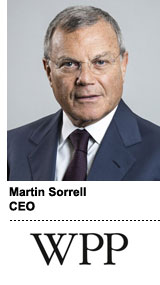
Despite a slight uptick in CPG volumes in Q4 2017, WPP CEO Martin Sorrell still predicts cyclical budget cutting from the sector due to pressure from activist investors and zero-based budgeting (ZBB).
“What we see in packaged goods, certainly, is a continued caution,” he said on WPP’s Q4 and FY 2017 earnings call Thursday. “I just think it would be rash to suggest that there’s been any meaningful change, as far as we’re concerned, as yet.”
Short-term pressure, ZBB, activist investors and private equity driving down margins, Sorrell said, will continue to be some of the biggest headwinds WPP faces in 2018, for which the company set a flat growth outlook.
But he also predicted that companies using ZBB, which are seeing little to no organic growth under their new strategies, will have to come back to marketing to grow their market share. Consumer staples dropped 6% on the S&P 500 in 2017, Sorrell said.
Still, some of the change is structural, which causes delay and uncertainty for WPP’s business.
“It causes every one of our clients to examine what the technological changes mean for them in terms of production, marketing and distribution,” Sorrell said. “The pace is likely to intensify.”
Other industries, including tech, financial services, health care and telcos, present growth opportunities for WPP, Sorrell said. And some geographies, like Latin America, will continue to grow.
But with net sales down 0.9% and like-for-like revenues down 0.3% for the year, WPP reported its worst financial year since the 2008-2009 economic crisis. Reported revenues were down 0.6% in 2017 to $21.2 billion and 1.2% in Q4. Its stock dropped up to 15% Wednesday morning, its furthest plunge since 1999.
WPP predicted a flat outlook for 2018 and lowered long-term earnings growth projections from 15% to 5%.
“2017 was not a pretty year,” Sorrell said, “with flat like-for-like, top-line growth and operating margins and operating profits also flat, or up marginally.”
To embrace changing times, WPP is marching toward unifying the business to make it easier for clients, partners and employees to navigate its offerings, something the company “maybe didn’t do fast enough before,” Sorrell admitted. Kantar is an area where WPP has been particularly slow to capitalize on the opportunity to integrate media with data, he said.
“To be absolutely, brutally frank about it,” he said, “the data business has been a laggard for us in terms of top-line growth for a number of years. I don’t think we’ve leveraged Kantar, and I don’t think Kantar has leveraged GroupM and Wunderman, in the way we should’ve done. We must continue to try and pull those things together.”
GroupM is already starting to leverage Kantar more heavily, said Kelly Clark, CEO of GroupM, on the call. Triad, for example, which WPP acquired under Xaxis in 2016, will use Kantar’s retail data to create better solutions for clients.
“We’re looking at how we combine those businesses into a more compelling offer for clients who are under enormous threat in the retail space,” Clark said.
Sorrell touted other areas of integration across WPP, including unifying Wunderman’s 20 brands, merging MEC and Maxus at GroupM and consolidating Ogilvy under a single brand. But he’s keenly aware of the challenges of mashing agencies together.
“When you put companies together, there are good things that happen and there is breakage,” he said. “You might want to put it simply on a piece of paper and explain it simply, but that simple explanation ignores the reality.”
Breaking down WPP’s spend for the year, Google and Facebook were its top two investment platforms, commanding $7 billion of the holding company’s $75 billion media budget. Sorrell told investors that Google and Facebook are becoming easier to work with and less likely to disintermediate its relationships with clients.
Amazon, however, is “coming over the hill” and “certainly poses a big threat on search and advertising,” Sorrell said.
“Everybody’s focus is on Google and Facebook and we don’t think that’s as much of an issue as some people make it out to be,” he said. “But Amazon, there is head-to-head competition coming there. Voice is going to become increasingly important. Amazon has sort of carpet bombed the voice real estate with Alexa.”
This post was syndicated from Ad Exchanger.

More Stories
Daily Wire Welcomes Perplexity to Advertise on The Ben Shapiro Show
Here’s the Roundup for the Week Ending March 7
Aflac’s Dan Amos Reveals How He’s Successfully Held Onto the CEO’s Job for 35 Years